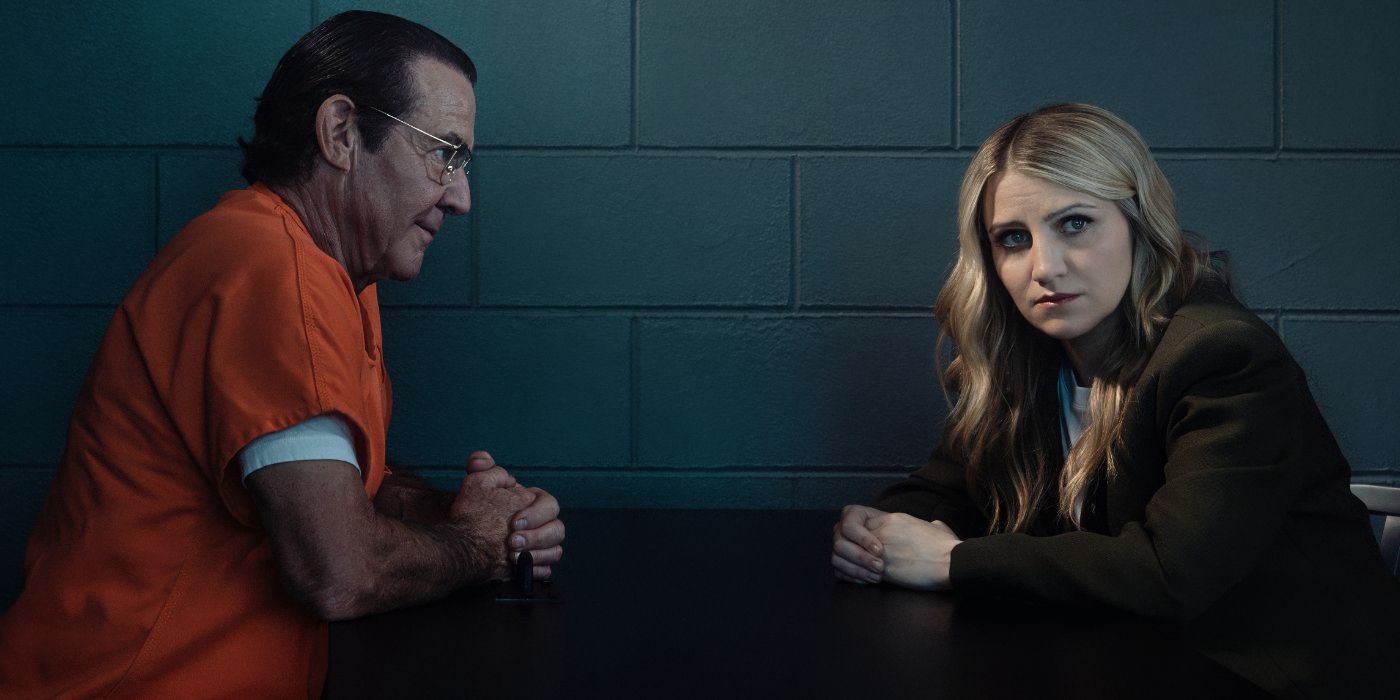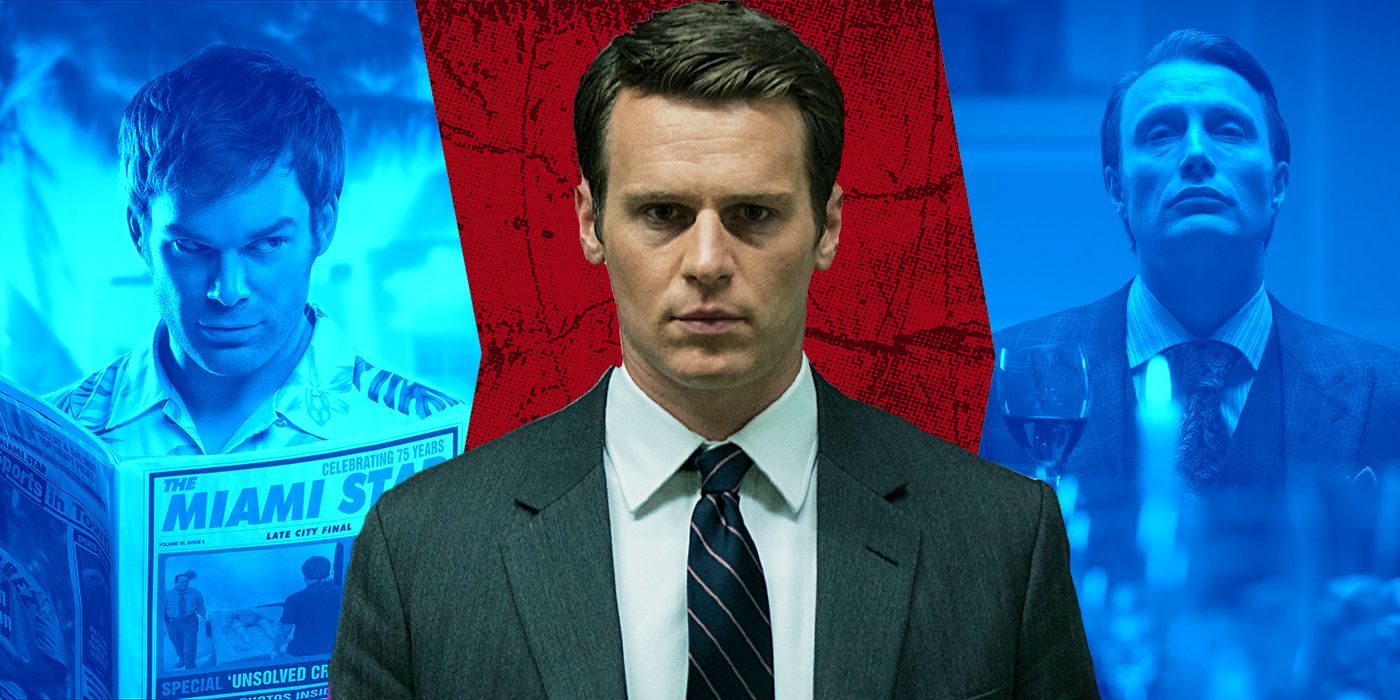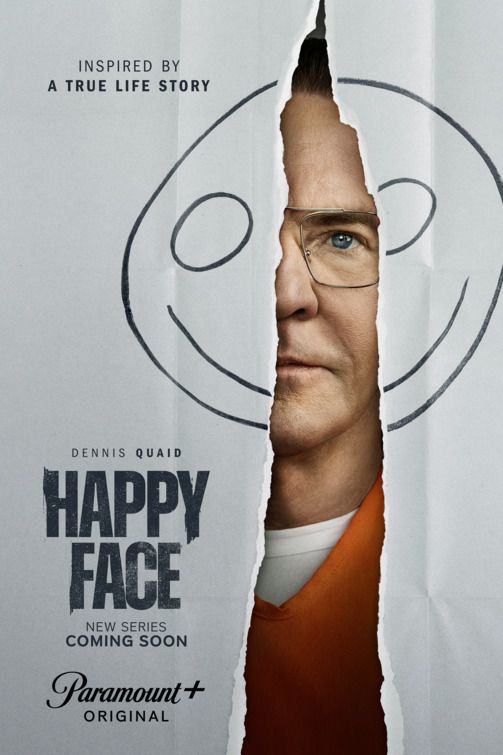Physical Address
304 North Cardinal St.
Dorchester Center, MA 02124
Physical Address
304 North Cardinal St.
Dorchester Center, MA 02124

True crime has always cast a perverse spell over society’s imagination, but the topic’s contemporary popularity boom has propelled it into a consistent limelight. For some, devouring entertainment devoted to crime cases provides a safe avenue for them to explore their primal fears. For others, their fascination morbidly exploits real-life tragedies at the expense of respecting the victims’ memories and the privacy of their grieving loved ones. Although Paramount+’s upcoming drama Happy Face is born from this ecosystem, the series voices a rarely seen perspective. Happy Face is based on the podcast of the same name by host Melissa Moore, the daughter of Keith Hunter Jesperson, the serial killer dubbed “the Happy Face Killer.” In 2021, Moore told Marie Claire why she decided to come forward after decades of avoiding any association with her vile father: “My intent is to tell these stories that we think we know, but from a different point of view, the point of view of a survivor, somebody who’s related to or lived with the killer or the victim.”
Created by showrunner Jennifer Cacicio as well as the powerhouse executive producing duo Robert and Michelle King (Evil, The Good Wife), Happy Face strikes an impressive blow against our culture’s habitual glorification of serial killers. This fictionalized chronicle of Moore’s life is the next step in her awareness-raising and community-building advocacy, and Happy Face mostly accomplishes its goal, but not without some rocky bumps along the way.
As Melissa Moore (Annaleigh Ashford) prepares for her daughter’s birthday party, she experiences a visceral reaction to specific items in the grocery store: a roll of duct tape, a package of zip ties. The innocuous objects carry horrifying memories — when Melissa was 15 years old, she discovered the father who doted on her was a rapist and a serial killer responsible for the brutal deaths of at least eight confirmed women. According to his confession letters, Keith Hunter Jesperson (Dennis Quaid), a long-haul truck driver, began killing in 1990 and went undetected until he turned himself in. Before the court sentenced him to serve three consecutive life sentences, his signature on those same letters was a boastful, haunting smiley face.
Along with the eight families thrown into eternally devastating upheaval, learning about Jesperson’s sadism left Melissa’s Pacific Northwest childhood in ruins. The man who caused such harm wasn’t the father she knew, even though she witnessed so-called warning signs. Now an adult, Melissa still carries the burden of guilt and shame. She can’t help but feel responsible, wondering if she could have stopped her father if she acted upon her uneasy suspicions. But Melissa was a child living with an emotionally manipulative and abusive parent; it was unfathomable to consider that Jesperson’s inconsistencies hinted at a heinous truth.

Related
The 10 Best Crime Shows Like ‘Mindhunter,’ Ranked
These series unmask the criminal mind.
By the time Happy Face opens, Melissa has cut all ties with Jesperson, changed her last name, and married Ben Moore (James Wolk), with whom she has two children, high schooler Hazel (Khiyla Aynne) and nine-year-old Max (Benjamin Mackey). She’s also become a makeup artist for The Dr. Greg Show, a daytime health and wellness talk show. When her father successfully reaches Melissa, he captures her unwilling attention by dangling a shocking admission like a cat playing with a mouse – Jesperson claims he killed a ninth woman, Heather (Leah Jacksties), and has finally decided to come forward.
The timing of Jesperson’s confession is crucial, as the man convicted of Heather’s murder, her boyfriend Elijah (Damon Gupton), is a Black man on death row with less than 50 days left before his execution. To prove Elijah’s innocence and confirm her father’s involvement, as well as offer fellow survivors a sympathetic lifeline, Melissa broadcasts her connection to Jesperson via The Dr. Greg Show. Opening up on national television makes her vulnerable to harassment from family members of Jesperson’s victims, but it also links her to people in similar situations who are seeking solace. And the more Melissa speaks with her father, the more their precarious conversations shatter the preconceptions she once used as safeguards against her trauma.
When the series starts, Melissa insists her father exhibited some caring, positive qualities. That sentiment may not hold by the end of Happy Face‘s eight episodes (all of which were provided for review). Unlike other crime dramas based on true stories, like Netflix’s Mindhunter or Apple TV+’s Black Bird, this series isn’t trying to probe the depths of a serial killer’s psychology. Happy Face‘s dramatic impetus stems from exploring a very specific kind of trauma: being the child of a vicious mass murderer whom you once loved, as well as the life-shattering anguish felt by those related to his victims. Mothers grieving their daughters, a son left alone in the world without his mother, siblings desperately seeking justice — when a serial killer strikes, the ripple effects stain everything in sight.
For Melissa specifically, Jesperson’s confession and her subsequent investigation causes friction within her otherwise loving family. Generational trauma proves impossible to avoid and nearly impossible to navigate. After all, grief never leaves; it merely transforms before sneaking up on you like a thief in the night. Beyond this uncomfortable fact, Melissa herself can no longer deny her greatest fear — that she inherited her father’s darkness.
Focusing on the victims doesn’t mean Happy Face ignores Jesperson’s psyche, but it does demystify the celebrification of serial killers. Hazel’s best friend Eva (Momona Tamada) self-describes herself as a “murderino,” a term for the fanbase of the My Favorite Murder podcast, and eagerly drags Hazel to a museum exhibit devoted to serial killers, including Jesperson. People pass around trivia and sell art about the man who brutally ended eight lives, but can’t be bothered to honor his victims’ names.
As for Jesperson, he occasionally demonstrates what appears like tenderness on the surface. But if Melissa utters a single word he dislikes, he turns visceral and venomous on a dime. A walking example of narcissism, everything he does is to satiate his starving ego. It’s normal to struggle our way through understanding how anyone could commit such heinous acts, and part of that psychological excavation is wondering whether a man like Jesperson can feel love. Without revealing any spoilers, Happy Face definitely answers that question — and even if it chooses to remain ambiguous, Jesperson undeniably gaslights Melissa and weaponizes their memories against her. No hunt for the slimmest of redemptive qualities is worth the scrutiny these men receive.
With this survivor-first focus in mind, Happy Face winds up as more of a family drama fused with investigative journalism than a typical crime-based series. Overall, the show isn’t as sinister as one might expect. The writing and directing team emphasizes a dryly ironic side — a tactic that does make the subject matter easier to swallow, but also raises an emotional barrier against the audience. For a topic so fraught, intimate, and misunderstood, Happy Face‘s tonal consistency and thematic authenticity mean that the series doesn’t truly find itself until the halfway mark. Because it doesn’t fully commit to either a black comedy mood or the grime-infested toxicity of a series like True Detective, its early episodes feel disconnected from the required gravitas. Key emotional moments fizzle out rather than burn the building down. Even though its pieces do solidify into a coherent and satisfying whole around the midway point, combining that initial remove with generic dialogue and performances that read a little too artificial across the board makes Happy Face‘s first half difficult to grasp.
As for those performances, Quaid’s Jesperson is half-menacing and half-kooky in a manner that calls to mind an off-brand Joker. Whether this is an accurate portrait of Jesperson’s demeanor or not, one can’t help but wonder if a calmer, less unraveled interpretation would have produced a more chilling outcome. Quaid is neither quite extreme nor diabolical enough to the point of feeling miscast. His best moment occurs when another character confronts him about his actions, and instead of striking out with one of his deplorable rants, he crumbles, mumbling his way through worthless, self-serving apologies. Jesperson’s manipulative power might extend beyond the prison walls, but he’s nothing more than a pathetic man who kills for pleasure.
Ashford, meanwhile, takes a moment to settle into her role; the series’ uneven tone seems to restrain her abilities. Once the series levels out, so does Ashford, and she sells the manifold nuances of Melissa’s existence. As a family drama first and foremost, Happy Face indulges in several sweet, quiet, and necessary moments, like Melissa lying on Hazel’s bed as they share an intimate conversation or Ashford pretending she isn’t a Tony Award-winning singer at the karaoke microphone. When Melissa weeps, her face streaked with wet mascara, the scene rings out as shattering and cathartic.
Happy Face‘s final scene leaves the door open for a potential Season 2. If that renewal occurs, the series shouldn’t backslide Melissa’s development. The character’s journey hinges upon her reconciling with the ghosts of her past and re-seizing control from her scheming and loathsome father. Whatever the series’ future may be, even though Happy Face‘s initial tonal and dialogue weaknesses contribute to it falling just short of its potential, its comprehensive message — living with intricate wounds, elevating the scum of the earth while abandoning the victims, America’s profoundly flawed justice system, and the racist incarceration system — slices through the noise loud and clear.
Happy Face premieres March 20 on Paramount+, with new episodes airing Thursdays.

Happy Face
Happy Face takes a shot at our culture’s obsession with serial killers, though not without some bumps along the way.
March 20, 2025
Paramount+
Michael Showalter